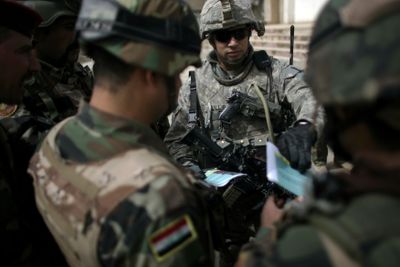Iraq adamant on U.S. pullback
Troops must leave cities by June 30 deadline

BAGHDAD – Iraq’s government on Monday ruled out allowing U.S. combat troops to remain in Iraqi cities after the June 30 deadline for their withdrawal, despite concern that Iraqi forces cannot cope with the security challenge following a resurgence of bombings in recent weeks.
Asking U.S. forces to stay in the cities, including volatile Mosul in the north, would be embarrassing for Iraq’s prime minister, who has staked his political future on claims that the country has turned the corner in the war against Sunni and Shiite extremists.
The departure of heavily armed combat troops from bases inside the cities is important psychologically to many Iraqis, who are eager to regain control of their country after six years of war and U.S. military occupation.
U.S. officials played down the Iraqi decision, with Pentagon spokesman Bryan Whitman saying it’s up to the Iraqi government to request an extension of the U.S. presence in the cities and “we intend to fully abide by” terms of the security agreement.
The chairman of the Joint Chiefs of Staff, Adm. Mike Mullen, told reporters Monday that violence had not risen to a level that would force a change in the withdrawal schedule.
Last month, however, the top U.S. commander in Iraq, Gen. Raymond Odierno, said he was worried that Iraqi forces won’t be ready to assume full responsibility for Mosul by the end of June.
Privately, some U.S. officers fear the Iraqis may lose control of Mosul within a few months after American forces pull out of Iraq’s third largest city, where al-Qaida and other Sunni militants remain active.
The U.S.-Iraq security agreement that took effect this year calls for American combat troops to leave urban areas by the end of June, with all U.S. forces out of the country by the end of 2011.
But a series of high-profile bombings has raised questions whether Iraqi forces can assume more security responsibilities, especially in Mosul.
Nationwide, at least 451 people were killed in political violence last month, compared with 335 in March, 288 in February and 242 in January, according to an Associated Press tally.
The security agreement allows Prime Minister Nouri al-Maliki to request an extension of the deadlines if he feels Iraqi forces need help. But the prime minister’s spokesman said the withdrawal deadlines, including the June 30 date, were “non-extendable.”
“These dates cannot be extended and this is consistent with the transfer and handover of responsibility to Iraqi security forces,” spokesman Ali al-Dabbagh said in a statement.